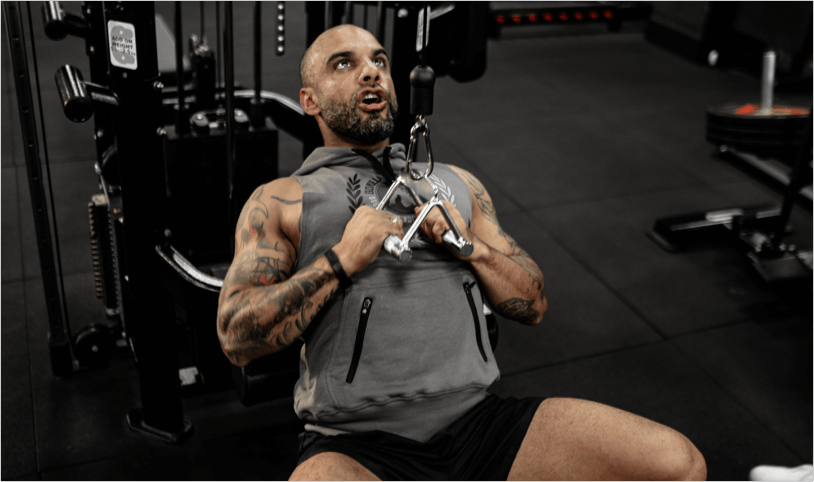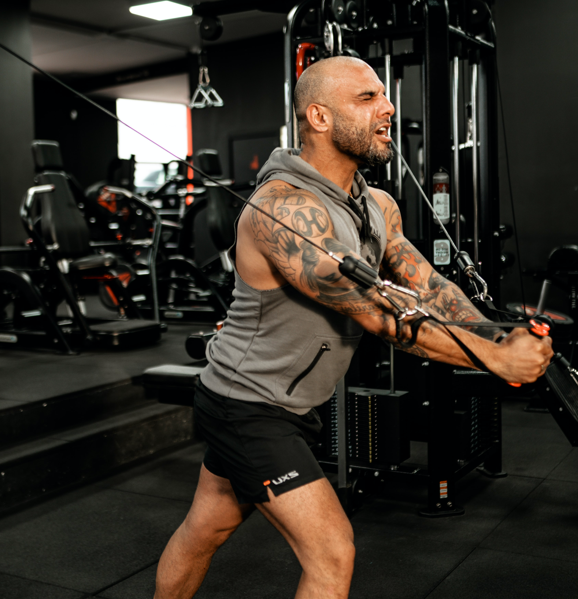- Incorporate Compound Exercises: Include moves like squats, deadlifts, pull-ups, and bench presses in your workout to stimulate multiple muscle groups and promote muscle growth
- Prioritize Resistance Training: Kickstart muscle growth through resistance training, which involves lifting heavy loads for repetitions to stimulate the release of muscle-growing hormones and other metabolites.
- Maximize Protein Synthesis: Ensure your body stores ample protein through a process called protein synthesis to support muscle growth. Consume sufficient protein to build and store new proteins faster than your body breaks down old proteins.
- Caloric Surplus and Proper Nutrition: Provide your body with appropriate amounts of calories and nutrients, particularly protein, to support muscle growth. A caloric surplus and sufficient protein intake are essential for muscle hypertrophy.
- Progressive Overload: Continually challenge your muscles by gradually increasing the weight, sets, and repetitions to ensure consistent, long-term gains in both muscle size and strength.
- Short and Intense Workouts: Make your workouts short and intense rather than long and leisurely to optimize muscle growth and recovery.
- Rest and Recovery: Ensure proper sleep, rest days, and muscle recovery techniques to allow for muscle repair and growth.
- Vary Your Exercises: Vary your exercises to fire up different or multiple muscle fibers, promoting overall muscle growth and development.
- Proper Form and Training Frequency: Perform each exercise with proper form, and consider the importance of progressive overload and training frequency for muscle growth.
- Avoid Wasting Time and Money: Refrain from investing in unproven powders, pills, and products that claim to increase muscle mass, and seek professional advice for personalized guidance.
In summary, to increase muscle size, it’s crucial to focus on resistance training, proper nutrition, progressive overload, and adequate rest and recovery. By incorporating these tips into your workout routine, you can effectively promote muscle growth and achieve your desired results.
Incorporate Compound Exercises:
Compound exercises involve multiple muscle groups and joints, making them highly efficient for overall strength and muscle development. Examples include squats, deadlifts, and bench presses. Research shows that compound movements elicit a greater hormonal response, promoting increased testosterone and growth hormone production, essential for muscle growth and fat loss.
Prioritize Resistance Training:
Resistance training, also known as strength training, is crucial for building and maintaining muscle mass. It increases basal metabolic rate (BMR), helping with weight management. Studies consistently show that resistance training improves insulin sensitivity, reduces the risk of chronic diseases, and enhances overall functional capacity, especially as we age.
Maximize Protein Synthesis:
Protein synthesis is the process by which the body builds and repairs muscle tissues. Consuming an adequate amount of high-quality protein is essential to support this process. Research suggests that spreading protein intake evenly throughout the day, especially post-workout, optimizes protein synthesis. Aim for 1.6-2.2 grams of protein per kilogram of body weight for optimal muscle growth.
Caloric Surplus and Proper Nutrition:
To gain muscle mass, a caloric surplus is necessary. Consuming more calories than your body expends provides the energy needed for muscle growth. However, it’s crucial to prioritize nutrient-dense foods, including a balance of carbohydrates, proteins, and fats. Nutrient timing is also important, especially around workouts, to provide the body with the necessary fuel for optimal performance and recovery.
Progressive Overload:
Progressive overload is the gradual increase of stress placed upon the body during exercise. This can be achieved by increasing weight, volume, or intensity over time. It’s a fundamental principle for continuous muscle adaptation and growth. Scientifically, progressive overload stimulates muscle fibers and triggers the release of anabolic hormones, promoting hypertrophy.
Short and Intense Workouts:
Studies support the efficacy of shorter, high-intensity workouts for muscle growth. Short, intense sessions can enhance metabolic rate, improve cardiovascular health, and lead to comparable gains in muscle mass compared to longer workouts. High-intensity interval training (HIIT) is a popular approach, offering both cardiovascular and strength benefits.
Rest and Recovery:
Muscles need time to repair and grow stronger. Overtraining can lead to fatigue, increased risk of injury, and hinder progress. Adequate sleep, rest days, and active recovery techniques are vital. During sleep, the body releases growth hormone, aiding in muscle repair. Scientific evidence supports the importance of proper recovery for optimal performance and muscle development.
Vary Your Exercises:
Constantly challenging your muscles with varied exercises prevents adaptation and plateaus. Scientifically, the concept of muscle confusion suggests that changing exercises regularly can lead to greater gains. Different movements target muscles from various angles, promoting overall development and reducing the risk of overuse injuries.
Proper Form and Training Frequency:
Maintaining proper form during exercises is crucial for safety and effectiveness. Incorrect form can lead to injuries and reduce the effectiveness of the workout. Consistency in training frequency is also important. Research shows that regular, consistent training is more effective for muscle growth than sporadic, intense sessions.
Avoid Wasting Time and Money:
Understanding your fitness goals, choosing effective exercises, and following a well-designed program can prevent wasted time and money. Focusing on evidence-based practices and avoiding unnecessary supplements or equipment can streamline your fitness journey. Consult with fitness professionals or certified trainers for personalized guidance.
Incorporating these principles into your fitness routine provides a comprehensive and science-backed approach to muscle growth and overall health. Remember to consult with healthcare professionals or fitness experts before making significant changes to your exercise or nutrition regimen.








